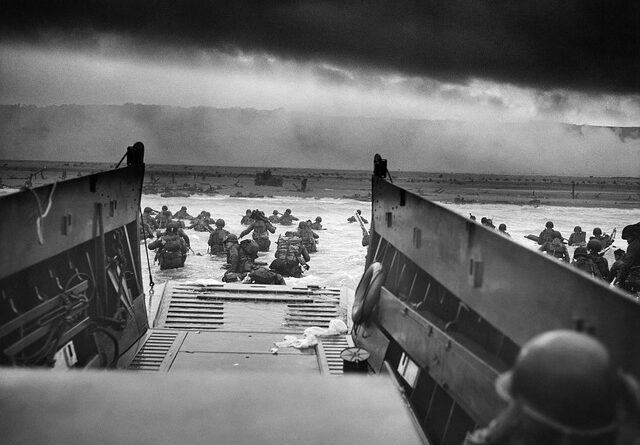World War II: Stories of Heroes Never Die
Baltimore – Eighty years ago this week, the organized killing ended in Europe and the boys began packing their bags to come home. My father was one of them. He was stationed in Foggia, Italy, with the U.S. Army Air Force.
Years after the war ended, I asked him what he did on VE Day.
“Volunteered to go to the Pacific,” he said.
The war wasn’t over yet, no matter what President Donald Trump imagines. My father got lucky. Along with millions of other G.I.s stationed in Europe, he was eventually sent home to America instead of the fighting in the Pacific.
Japan was still holding on, and soldiers on both sides were still fighting and dying at appalling rates, until the U.S. dropped atomic bombs on Hiroshima and Nagasaki. That ended the war. It was in August, not May, of 1945.
Trump, famous for calling America’s war dead “losers” and “suckers” during his first term, when he took a pass on visiting the D-Day cemetery at Normandy, must have missed the last bloody months of the war.
Last week, he said he wants to designate May 8 as Victory Day for America. (Later, the White House withdrew the remarks.) Europe has always marked May 8 date – because that’s the date the fighting ended there. America should adopt that date for celebration, Trump said in an empty boast, because, “We did more than any other country, by far, in producing a victorious result.”
Somebody should mention that to our wartime ally, the Soviet Union, which lost 24 million people in the war.
The U.S. lost an estimated 407,000.
But this is the week the killing ceased in Europe, and it made me think of a ballpark this city used to have on 33rd Street, called Memorial Stadium, and the big plaque out front, which honored America’s war dead.
“Time will not dim the glory of their deeds,” it said.
In the sunlight of a September day some years back, I stood there with several World War II veterans. There was Daniel Brewster, who fought in the Pacific, in the assault waves on Guam and Okinawa, and came home to become a U.S. Senator.
Along with Brewster were civic leader Bill Boucher, Tom Bailey, Bill Tutton, Ed Hanrahan, and a fellow named Paul Wiedorfer, who spent Christmas Day, 1944, in the woods near Chaumont, Belgium, and took on the Germans all by himself.
As they stood there, gazing up at the big stadium plaque, Brewster told Wiedorfer, “Go ahead. Tell that story.” Wiedorder shuffled his feet and shook his head shyly.
They all had stories to tell. Hell, Brewster had a million of them. But they were a generation that mostly kept the stories to themselves. So Wiedorfer was reluctant, until some of the others prodded him.
“We were bogged down,” he finally said. He was a 24-year-old private who’d never been in battle before.
“Christmas Day,” he said. “Snowing like hell. You had to be a little crazy, I guess. I remember charging into enemy fire. I remember falling, slipping on ice, and then I got up and lobbed a grenade into this machine gun nest, and then another, and then these Germans were yelling, ‘I give up, I give up…’”
The language on the official citation Wiedorfer received was more explicit.
His company was moving across a clearing near Chaumont “when they were met by heavy machine gun fire from two German positions dug in at the wood’s edge. Wiedorfer, realizing his platoon could not advance until the enemy machine guns were destroyed, voluntarily charged alone, without a protective cover of any kind.
“Miraculously escaping injury, Wiedorder reached a point 10 yards from the first machine gun emplacement and hurled a grenade into it, killing three men manning the gun. (Then) he began to attack the second position with his rifle. One of the enemy was wounded by the fire, and the other six immediately surrendered.
Moments later, 14 more German soldiers who had seen the action came out with their hands up and surrendered to the American private.
Eighty years since the end of the bloodshed in Europe, we still find such stories stirring. But there was still much combat ahead. So let’s get the record straight.
This week 80 years ago, the lucky ones were starting to come home – if they weren’t shipping out to the fighting and dying that awaited them in the Pacific.

Michael Olesker, columnist for the News American, Baltimore Sun, and Baltimore Examiner has spent a quarter of a century writing about the city he loves.He is the author of several books, including Michael Olesker’s Baltimore: If You Live Here, You’re Home, Journeys to the Heart of Baltimore, and The Colts’ Baltimore: A City and Its Love Affair in the 1950s, all published by Johns Hopkins Press.


Congratulations to the Baltimore Post-Examiner and to Michael Olesker for this beautifully written tribute to all of our World War II veterans. I also greatly appreciate Olesker’s thoughtful commentary about our own Maryland heroes who fought in both the European and Pacific theaters, which also included the very moving recounting of those veterans who gathered below the Memorial Plaque at Baltimore’s old Memorial Stadium.
I was particularly struck by the comment that Michael Olesker’s own father made regarding the United States’ victory in Europe and his service with the Army in Italy at the time, when asked what he planned to do next and he responded “Go to the Pacific” to join our troops there in those final brutal months.
Such articles that truthfully record our nation’s history need to continue to be told to not only educate certain politicians but also for the benefit of future generations who need to know what really happened …